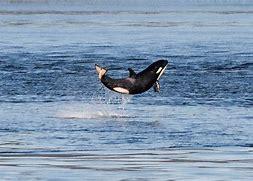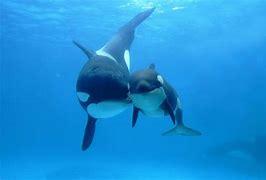Results: Orcas Rule the Oceans, part three
Published on 09/14/2022
Orcas were long considered one species, but now it appears that there are several species (or at least, subspecies—researchers are still figuring this out) of orcas. As researchers learn more about orcas, they have proposed separating them into different species or subspecies based on genetics, diet, size, vocalizations, location and physical appearance. https://passportocean.com/2018/10/16/facts-about-orcas/ is the source for this survey.

QUESTIONS
GO to COMMENTS
Comments
1.
1.
Killer whales use a variety of sounds for communicating, socializing and finding prey. These sounds include clicks, pulsed calls, and whistles. Their sounds are in the range of 0.1 kHz to about 40 kHz. Clicks are primarily used for echolocation, although they may also be used for communication. The pulsed calls of killer whales sound like squeaks and squawks and appear to be used for communication and socialization. They can produce sounds very rapidly—at a rate of up to 5,000 clicks per second. Different populations of killer whales make different vocalizations, and different pods within these populations may even have their own dialect. Some researchers can distinguish individual pods, and even matrilines (the line of relationship that can be traced from one mother to her offspring), just by their calls. Meanwhile, pods speak completely different languages. Clans coming together for a chat would be like an English speaker, Russian speaker and Chinese speaker trying to have a conversation. Did you realize that orcas could communicate in so many different ways?

Yes
31%
711 votes
No
55%
1254 votes
Undecided
15%
335 votes
2.
2.
Neuroscientist Lori Marino and a team of researchers explored the brain of a dead killer whale with an MRI and found an astounding potential for intelligence. Orcas, have the second-biggest brains among all ocean mammals, weighing as much as 15 pounds. It's not clear whether they are as well endowed with memory cells as humans, but scientists have found they are amazingly well wired for sensing and analyzing their watery, three-dimensional environment. Scientists are trying to better understand how killer whales are able to learn local dialects, teach one another specialized methods of hunting and pass on behaviors that can persist for generations — longer possibly than seen with any other species except humans. While researching this survey series, I found the orcas to be much more intelligent than I had previously understood. Do you agree?

Yes
64%
1461 votes
No
15%
335 votes
Undecided
22%
504 votes
3.
3.
After the SeaWorld tragedy, in 2010 where a trainer was killed, orcas were stigmatized for being a threat to humans. Researchers have yet to find evidence that an orca in the wild has ever killed a person. But they aren't surprised that the world's biggest, most powerful and possibly smartest predator, captured and kept for years in a tank, cut off from the influences of an extended family, could have a fatal encounter with a human. Is it wrong to capture and train orcas for the entertainment of people?

Yes
60%
1369 votes
No
16%
365 votes
Undecided
25%
566 votes
COMMENTS


